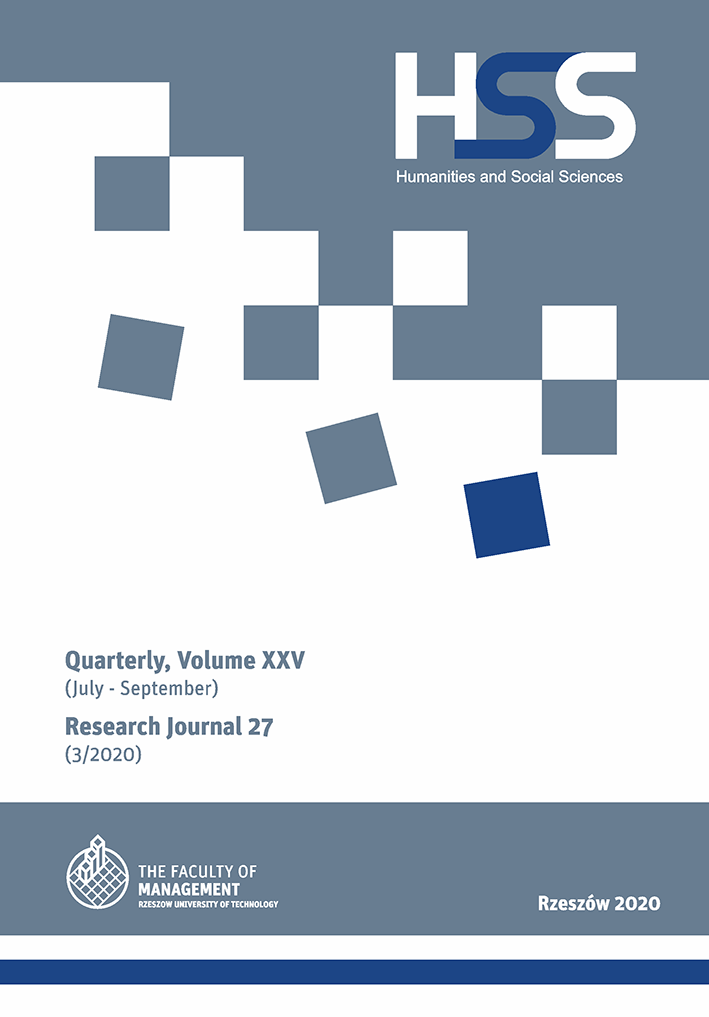Abstract
This study presents an analysis of program assumptions regarding the energy policy of the Russian Federation. The research methodology involves an analysis of normative acts, current data, and a review of the academic literature. I conclude that the Russian Federation uses the hydrocarbon transmission system to achieve the status of an energy superpower and is able to use its resources and infrastructure to act as an important player in the international arena. The transformation of the energy sector is not only limited to measures aimed at increasing efficiency, but it also plays a decisive role in building the state's potential and co-creating the essential instruments of international influence. Through building the net of pipelines, the Kremlin is consistently able to attain its geopolitical aims. Inefficient attempts to break out of Russian domination of energy has allowed Russia to maintain its infrastructure monopoly and dominate the gas markets of Central and Eastern Europe.
References
Czachor, R. (2008). Polityczne uwarunkowania budowy Gazociągu Północnego: polityka energetyczna Federacji Rosyjskiej a solidarność europejska (Political circumstances for the construction of the Northern Gas Pipeline: the energy policy of the Russian Federation and European solidarity) [in:] Winnicki, Z.J., Baluk, W., ed., Badania wschodnie. Polityka wewnętrzna i międzynarodowa (Eastern research. Internal and international policy). Wrocław: Oficyna Wydawnicza Arboretum.
Fredholm, M. (2005). The Russian Energy Strategy & Energy Policy: Pipeline diplomacy or mutual dependence?, Camberley, England: Conflict Studies Research Centre, 2005.
Goldmann, M.I. (2008). Putin, Power, and the New Russia: Petrostate. New York: Oxford University Press.
Gołaś, K. (2011). Region Kaukazu w polityce Federacji Rosyjskiej – wybrane aspekty (Caucasian region in Russian Federation politics – selected aspects). „Przegląd Geopolityczny” (“Geopolitical Review"), t. 3.
Gryz, J. (2009). Geopolityczne aspekty polityki energetycznej Federacji Rosyjskiej, (Geopolitical aspects of the Russian Federation's energy policy). “Przegląd Geopolityczny” (“Geopolitical Review”), t. 1.
Hill, F. (2004). Energy Empire: oil, Gas and Russia Revival, brookings.edu [Access: 25.10.2019]. Access on the internet: http://www.brookings.edu/research/articles/2004/09/russiahill.
Kardaś, S. (2017). Na rozdrożu, Aktualne problemy rosyjskiego sektora gazowego (At the crossroads, current problems of the Russian gas sector). Warsaw: OSW.
Kozłowski, S.C. (2017). Zwrot Ku Azji – wizja i Strategia polityki Federacji rosyjskiej (Return towards Asia – the vision and strategy of the Russian Federation). “Nowa Polityka Wschodnia” (“New Eastern Policy”), Vol. 1/2017.
Madera, A.J. Polityka energetyczna Rosji (Russian energy policy) [Access: 18.09.2019]. Access on the internet: http://www.wnp.pl/artykuly/polityka-energetyczna-rosji,5610.html.
Mickiewicz, P. (2018). W poszukiwaniu teoretycznych podstaw rosyjskiego myślenia strategicznego ery W. Putina (In search of the theoretical foundations of Russian strategic thinking of the W. Putin era). “Rocznik Bezpieczeństwa Międzynarodowego” (“Yearbook of International Security”), Vol. 12, No. 2.
Musiałek, P. (2013). Geoekonomia czy geopolityka? Strategia Gazpromu na rynku gazu państw Unii Europejskiej (Geoeconomics or geopolitics? Gazprom's strategy in the gas market of European Union countries). „Kultura i Polityka: zeszyty naukowe Wyższej Szkoły Europejskiej im. Ks. J. Tishnera w Krakowie” („Culture and Policy: scientific notebooks of the Higher School of Europe im. Fr. J. Tishner in Krakow”), nr 14/2013.
Musiałek, P. Koniec projektu Nabucco West. Spektakularny sukces Rosji i klęska unijnej dyplomacji (End of the Nabucco West project. Russia's spectacular success and the defeat of EU diplomacy) [Access: 18.10.2019]. Access on the internet: http://eksperci.kj.org.pl/wp-content/uploads/2013/07/Nabucco-komentarz.pdf.
Paszyc, E., Wiśniewska, I. (2005). The Russian Economy Under Putin. Growth factors and impediments to economic development, CES Studies.
Potulski, J. (2011). Rosja Putina – polityczny projekt budowy rosyjskiej państwowości (Putin's Russia – a political project to build Russian statehood). „Nowa Polityka Wschodnia” („New Eastern Policy”), nr 1 (1).
Raś, M. (2015). Polityka Rosji wobec Ukrainy i jej implikacje dla ładu międzynarodowego w Europie (Russia's policy towards Ukraine and its implications for international governance in Europe) [in:] Czornik K., Lakomy, M., Stolarczyk, M. Implikacje konfliktu ukraińskiego dla polityki zagranicznej i bezpieczeństwa Polski. Aspekty polityczne, wojskowe, gospodarcze oraz społeczne (Implications of the Ukrainian conflict for Poland's foreign and security policy. Political, military, economic and social aspects). Katowice: Wydawnictwo Regionalnego Ośrodka Debaty Międzynarodowej przy Fundacji na rzecz Wspierania Edukacji i Rozwoju Samorządności wśród młodzieży Viribus Unitis.
Ruszel, M. (2011). Geopolityczne uwarunkowania bezpieczeństwa energetycznego Polski. „Społeczeństwo i Polityka” nr 2 (27).
Rzeszutko-Piotrowska, M. (2014). Aktywność Federacji Rosyjskiej w regionie Arktyki – wybrane problemy rywalizacji mocarstw. „Rocznik Bezpieczeństwa Międzynarodowego”, Vol. 8, No. 1.
Sergunin, A., Konyshev, V. (2018). Russia’s Arctic Strategy [in:] Studin, I., ed., Russia, strategy, policy and administration. London: Palgrave Macmillan.
Szoszyn, R. Arktyczne tajemnice Moskwy [Access: 25.08.2019 r.]. Access on the internet: https://www.rp.pl/Rosja/190739800-Arktyczne-tajemnice-Moskwy.html.
Włodkowska-Bagan, A. (2017). Polityka Rosji na obszarze poradzieckim (Russia's policy in the post-Soviet area). „Wschodni Rocznik Humanistyczny” („Eastern Humanities Yearbook”), Vol. XIV, No. 3.
Wyganowski, J. (2014). Dlaczego Rosja bierze Krym? (Why does Russia take Crimea?), „Energia Gigawat”, nr 3/2014 [Access: 22.11.2019]. Access on the internet: https://www.cire.pl/pliki/2/dlaczegorosjabierzekrym.pdf.
Zolotova, M. (2014). Arktike net alternativi Odnako [Access: 20.11.2019]. Access on the internet: http://www.odnako.org/almanac/material/arktike-net-alternativi/.


